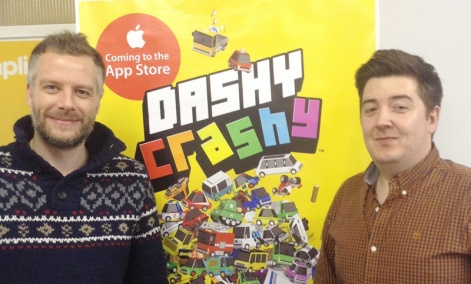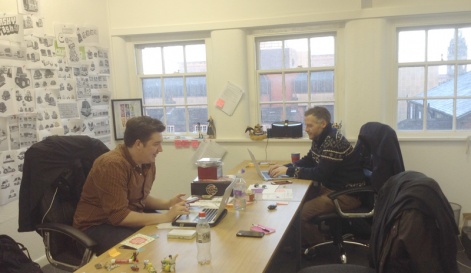Looking out the window of Dumpling Design's office to a cold, grey, wet December day, it makes you wonder why anyone would choose to set up shop in Sheffield.
But for Travis Ryan, the studio head, it's not only his home but also a huge part of his life.
Even the building that Dumpling's office resides in is steeped in personal history, as it used to be home to Gremlin Interactive, where he got his first job as a tester.
A chance encounter
"I had one of those rare moments when I was sat playing this game, and this old dude sits next to me and says 'what do you think?', and I just ripped it to shreds," says Ryan, talking about how he got started in the industry.
The "old dude" in question was Gremlin managing director Ian Stewart, who took Ryan in for a meeting with the game's lead, which ended in Ryan transitioning into a design role.
From there Ryan moved to Sheffield-based Sumo Digital to work on OutRun 2 (a game that is an obvious influence on Dumpling's first release, Dashy Crashy) and other titles, before moving on to Rare.
It was at Rare that he met Brent Poynton, the self-titled "nerd" of the studio. "Travis handles the 'what', and I deal with the 'how'", explains Poynton.
Joining Rare as an engineer, Poynton worked on numerous projects, including being part of the small team that brought Xbox Live Avatars into existence, before becoming a producer for Rare.

"I was looking over my shoulder seeing designers and producers just spinning on chairs", he jokes, "and I thought, 'I can do this!'"
Change of pace
In 2013, Ryan left the company to form Dumpling Design. "I'd always liked making arcade games," he said, "but you'd spend all your time and energy making these games and they'd never get the same numbers as bigger games."
"But then mobile started coming out, and I realised that the market for arcade games was over there."
A lot of people said 'just do Crossy Road', use incentivized ads, but we just found it didn't work for us.Travis Ryan
Poynton only joined full-time in 2015, having grown bored of production. "I had thought the grass is greener, but it wasn't really."
"Where I get my joy is actually building games, it isn't really all the other stuff. I just like solving problems."
How to run a company
The first year was spent prototyping various ideas and, in Ryan's words, "trying to work out how to make games and run a company". It wasn't until the start of 2015 that the two, after discussing a game idea in a bar in Japan, decided to give it a real go.
"The game was going well, the relationship had clicked, we thought, we could actually do this," says Ryan, "but it was going to require a bunch of money.
So we looked around and thought 'what have we got?'"
What they had was a prototype for a game that would become Dashy Crashy, a fast-paced autorunner that has you speeding down the road, swiping between lanes to avoid traffic and rack up high scores.
Mo' monetisation, mo' problems
How to monetise the game became a months-long decision process, with such ideas as a "stick or twist" system, and many varieties on currency systems.
"There was a lot of people saying 'just do Crossy Road', telling us to use incentivized ads", explains Ryan, "but we just found it didn't work for us.
"We don't have a currency because we want people to play the game.
"A lot of the time with the Crossy Road-style games you see people playing the game less and playing the meta more, checking in every six hours to get rewards, but not actually playing the game."

They eventually settled on an ad-based system, in which players have six runs before having to watch an ad to top up their credits. You can also buy any of the game's cars, which range from 99c to $2.99, to remove all the ads.
"We'd be happy selling this game for 99 cents," says Ryan, "but we can't. So we wanted to give people the best chance to enjoy it."
It takes guts
The "pay-what-you-like" system appears to have gone down well with players, although Ryan is slightly worried that "it might end up being a poor business decision."
But the two are sticking by it. Poynton says "it's a gut feeling, it kind of feels about right, it doesn't feel like we're ripping anybody off."
"We've had some feedback saying the ads are quite nice because it gives people a break. It's an intense game, it gives them a break before they go back in for a high score."
Poynton himself is a fan of the ads, admitting that "I actually picked up Boom Beach because of an ad in my own game."
Happy accidents
But it seems like the system has paid off. At the time of our visit, Dashy Crashy had around 350,000 downloads, with over 10 million plays, only three days after launch.
This might be down to the game itself, but also partially due to a turbulent launch that somehow managed to play in the game's favour.
According to Ryan, the game was ready to launch for September 2015, but a decision was made to redesign every car, because "they just weren't clicking."
The delay pushed them further and further back, until they found themselves in early December, unsure whether to launch in such a busy period without any advertising.
It normally takes about six or seven days, but Apple updated the game in an hour.Brent Poyton
"We don't have any PR, we don't have any marketing, we intentionally didn't want the game to have a long lead," explains Ryan.
"We wanted to be more like, oh you like this game? Go play it right now," adds Poynton.
You Only Live Once
The advice from other developers was to wait until January to avoid getting lost in the crowd, but the team decided instead to stick with the popular acronym "YOLO" (You Only Live Once) and just release it.
"It was literally a moment where we sat round the table, and said, 'right, hands up for the YOLO'", laughs Poynton.

The decision then came to which day to launch on, eventually settling on December 17th, without having checked the other releases for that date.
"I've never been so scared of Katy Perry in my life," jokes Poynton, refering to Glu's release of Katy Perry Pop.
Unforseen consequences
The problems didn't end there, with the game being released with a game-breaking bug "that we couldn't have caught until the leaderboards started getting populated," according to Poynton.
But the bug might have actually helped them out. With it caught and fixed, Dumpling started trying to contact Apple to rush the update before the App Store was essentially closed for Christmas.
"It normally takes about six or seven days, but they updated it in an hour," says Poynton, "and we were sat here thinking, does this mean something?"
It ended up being a perfect storm of happy accidents.
And it seems like it did, as Apple then featured the game on App Stores across the world, in the UK, Europe, Australia, and even China.
It ended up being a perfect storm of happy accidents – with the game having launched so late, the game was now guaranteed to be featured over the Christmas break.
The swing of things
In fact, that push helped them get over a million downloads across the Christmas weekend – not bad for a company who, by their own admission, didn't want to spend a penny on user acquisition.
But they're not resting on their laurels just yet. The call for an Android version has been heard, and the two are looking into developing the game for Apple TV as well.
There's also plans for further updates to the game itself, with more cars to be added as time goes on.
"We're going to try and get into a content cadence that's better than every two months," says Ryan, with Poynton adding, "we're not just sending it to die."
And there is, of course, the next game. They're tight-lipped on exactly what that game will be, but it's been described as "a versus game for everyone", with a focus on targeting a broad audience across both an app and a browser game.
The future's bright
"We want to just do stuff that's fun for us," says Poynton,."We've got to make our lives and jobs interesting."
"We're not looking to be a big studio," says Ryan, thinking about the future of the company.
"We're happy with just a handful of people sat in a room, working on problems."
And would they ever consider leaving Sheffield?
"There's actually a really interesting indie scene around," points out Ryan, "there's all kinds of developers around, and Yorkshire is an interesting hub for game development."
He gestures out the window towards Sumo Digital's headquarters, and we notice that the sun has finally come out. Maybe it's not such a bad place after all.





















